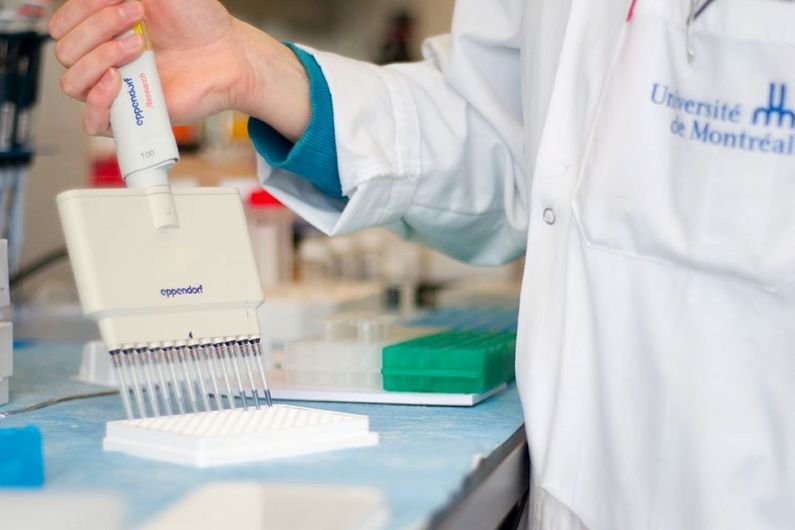Quebec gives UdeM $13 million to set up Médicament Québec
- Salle de presse
06/17/2021
- UdeMNouvelles
The Quebec government has awarded Université de Montréal $13 million to support the creation of Médicament Québec, an initiative that aims to revitalize the province's pharmaceutical industry.
The Quebec government will grant Université de Montréal $13 million over two years to finance Médicament Québec, an UdeM-led initiative that supports collaboration between the province’s colleges, universities and pharmaceutical industry.
Eric Girard, Quebec’s minister of the economy and innovation, and Christian Dubé, minister of health and social services, made the announcement recently at the Science Complex on UdeM’s MIL campus, with rector Daniel Jutras in attendance.
The ongoing public health crisis has underscored the need for Quebec to increase its independence in the areas of drug discovery, development and production, the partners believe.
“By supporting Médicament Québec, the Quebec government hopes to bolster the province's once-robust pharmaceutical industry,” said Girard. “With state-of-the-art facilities and leading expertise, we certainly have what it takes to further the industry's development.”
He added: “Our priority is to ensure the public has uninterrupted access to essential drugs. Médicament Québec will strengthen the local supply chain by facilitating collaboration between the industrial and academic sides of the province's life-sciences sector. In doing so, the initiative aims to prevent shortages that could adversely affect healthcare quality in Quebec.”
Médicament Québec will leverage the expertise from universities and colleges as well as the pharmaceutical industry's equipment and facilities. It will also foster partnerships with generic and innovative drug makers, biotech companies and manufacturing firms, while advancing the use of artificial intelligence in the drug discovery and development process.
“Over the past few years, UdeM has developed and maintained specialized expertise in all areas of drug discovery and production,” said Jutras. “Thanks to Médicament Québec, this knowledge and skill—supported by artificial intelligence—will be put to use for the public. Along with our partners from the university, college and industrial sectors, we expect to accelerate drug discovery and health innovation, step up local production and re-establish essential supply chains to protect the safety of Quebecers.”
Appointment of Arianne Trudeau
Arianne Trudeau is joining the UdeM Research Office team. She has been acting as project director since April 12 and will oversee the coordination of Médicament Québec's activities. She has more than 12 years of management experience in the prehospitalization field, having served as assistant executive director and director of finance at the Corporation d'urgences-santé. Ms. Trudeau has extensive experience in governance as well as in managing diverse and complex projects.
She holds a research-based MBA from UQAM, a Bachelor of Business Administration from the University of Manitoba and a certificate in post-secondary education from UdeM. She is also a certified company director.
UdeM's 3 bioinnovation and biomanufacturing units
Drug Discovery Unit
The Drug Discovery Unit at the Institute for Research in Immunology and Cancer plays a key role in Médicament Québec's bio-innovation activities. As the largest unit of its kind at a Canadian university, it focuses on the development and synthesis of new chemical compounds with biological or therapeutic potential. More than 60 chemists and biologists contribute to the Drug Discovery Unit's activities. With significant drug development experience in industrial environments, they have already succeeded in achieving results in the main therapeutic areas.
Biopharmaceutical Unit
The Biopharmaceutical Unit connects scientists with the expertise they need to evaluate the biopharmaceutical characteristics of compounds in the drug-discovery phase in order to select the best prospects, optimize their properties and propose innovative formulations, with a view to advancing them to the preclinical trial stage and increasing their chances of success in the clinical phase.
Continuous Flow Synthesis Laboratory
The Continuous Flow Synthesis Laboratory specializes in biomanufacturing—especially the production of biologically active molecules—and the innovation that goes into it. The lab houses state-of-the-art equipment used for on-demand synthesis of specific compounds, a technology that improves the manufacturing process in a number of ways. For instance, it enables the use of safer, more efficient, cost-effective and environmentally friendly processes, on both small and large scales. This in turn makes it possible to provide businesses with turn-key solutions. The lab is the largest of its kind in Canada and the third-biggest in the world.
Université de Montréal has developed strong capabilities in the areas of pharmaceutical research, drug discovery, development and commercialization by adopting a multidisciplinary approach with its partners in the university, college and industrial sectors. This is a significant advantage that's sure to help revitalize Quebec's pharmaceutical industry.













